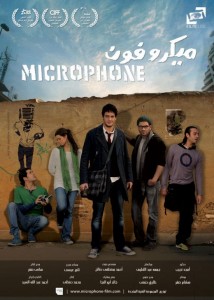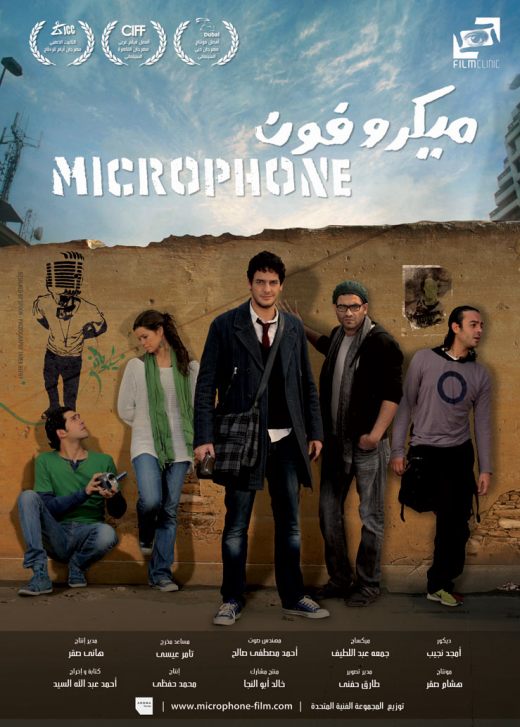By Mohammad Mirbashiri
Last year a dull and chilly autumn evening became the setting for a premiere screening as part of the BFI’s 54th London Film Festival.
So, to the southbank I went to watch the release of one of few Middle Eastern Films showing at the capitals’ most prolific film festival.
Microphone, the latest work of Egyptian director Ahmad Abdalla explores the underground music scene in Alexandria. It is a documentary-styled fiction-film reminiscent of Bahman Ghobadi’s No One Knows About Persian Cats. There are indeed many similarities which the Microphone director alluded to in the Q&A following the premiere screening; whilst the films did share many attributes, Microphone was in fact more documentary-styled and unscripted. Microphone is also less suspense and tension in comparison too. Abdalla’s film takes the viewer on an attractive journey through the turbulent currents faced by contemporary Egyptian youth who inhabit the northern Egyptian coastal city of Alexandria.
Around the central theme of youth and artistic expression the film explores a number of dichotomous themes such as art and resistance, fiction and reality, male and female through an array of young artists, musicians and filmmakers. Besides a handful of stars such as Meena Al Shalabi and Khaled Abol Haga the actors are in fact real-life musicians and artists from Alexandria. Filmed on a relatively low budget with a very basic Canon camera, it was impressively shot in it’s entirety in just four weeks.

The protagonist is Khaled (Khaled Abol Naga), a western-educated young man, who having lived in the west for several years returns to Alexandria and curiously sets out to explore the youth arts scene in the city. We are introduced to several notable profiles such as a pair of teenage graffiti artists, a hip-hop group with attitude and an all-girl heavy metal band aptly named Mascara who perform in masquerade; this is to prevent them from being recognised and the resulting backlash from their families and community.
A lot of what we see is presented through the lens of a pair of curious teenagers who go about the sunny Alexandrian streets documenting whatever they happen to find interesting. Besides the main theme of the neglected and struggling arts scene among Alexandria’s youth, Abdalla alludes to another aspect of life through the teenage love affair which blossoms between the two characters, Salma and Magdy. We also gradually learn of Khaled’s bruised relationship with Hadeer (Meena Shalabi), through scenic flashbacks of dialogue of them sat in a sea-view cafe, drinking coffee and puffing on cigarettes.
Khaled has several meetings with the comical head of the National Centre, or ‘Markaz al Watani’, who rejects permits and blocks opportunities for many of the artists to simply hold a performance or release a song. The western-educated authority fails to recognise graffiti art claiming grounds that it is imposed on the public. This is ironic when compared to the political posters and election campaign propaganda which fill the streets.

Apart from Hadeer and Khaled there are few characters in the film we get to really know. However, what we do get is an insight into the life of Alexandrian youth struggling to sing, perform and create art without the support and approval of the state. The film is thought-provoking and raises important questions such as, what extent are artists willing to resist or oppose the state? Perhaps, in the case of Egypt’s youth, Abdalla’s Microphone shows they are simply trying to live their lives the way they want – although even this is not entirely within their control.
Visually the scenes of Alexandria’s Mediterranean coast and the aged and worn-out baroque buildings are beautiful and the film has a great and varied soundtrack of rap, hip-hop, rock and oriental vibes. In particular, Massar Egbari’s tracks are pretty catchy.
Though the film was completed in 2010 it is all the more relevant now given the recent uprising in Egypt. It is easy to imagine that those who poured into Tahrir Square in the spring of 2011 were none other than the same disillusioned youth portrayed in Microphone, desperate for a platform to express themselves under a regime which amongst other things sought to stunt creativity.
For more information on Microphone, cast and crew visit www.microphone-film.net/
Images above, from top to bottom:
Official Microphone film poster
Aya and Ragab | Still from Microphone © Film Clinic, Egypt (2010)

